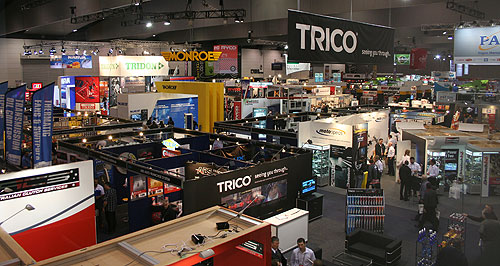Make / Model Search
News - General News - PartsParts industry savages Productivity CommissionUnsung: Local parts suppliers produce $5.2 billion worth of parts a year, and around $800 million of that output is exported. Industry policy vacuum holding back Australia’s auto parts industry, says AAAA5 Feb 2014 By IAN PORTER THE Australian Automotive Aftermarket Association (AAAA) has slammed last week’s Productivity Commission recommendations for the local car industry as a repeat of its “aggressively negative” stand on the auto sector. The AAAA also attacked the Abbott-led federal government for its lack of a “visionary” industry policy. The current policy settings were a disincentive to investment, it claimed. “The AAAA believes that Australian manufacturing industry as a whole desperately needs visionary policy settings from this federal government,” said AAAA executive director Stuart Charity. “We don’t need more enquiries or lectures about entitlement.” In its position paper published last week, the PC said all assistance to the car industry should cease by 2020 and that no special effort should be made to help Toyota continue its manufacturing operations past 2018, when the next generation Camry is due. It admitted that most displaced automotive workers were unlikely to find jobs and those that did would likely earn lower wages than at present. In his stinging rebuke of the position paper, Mr Charity said the position paper “trod the well worn path” of earlier PC enquiries. The PC had given only superficial consideration to the aftermarket parts suppliers, which produce $5.2 billion worth of parts a year, he added. Around $800 million of that output is exported.  Left: Executive director of the Australian Automotive Aftermarket Association Stuart Charity. Left: Executive director of the Australian Automotive Aftermarket Association Stuart Charity.“These 260 parts and accessories manufacturers … produce 36 per cent of all automotive output, yet receive no government assistance and minimal export support, and they are not constrained by inflexible, union-driven enterprise agreements,” Mr Charity said. “The AAAA submission to the Productivity Commission enquiry highlighted that recent government policy actually had a negative impact on the aftermarket.” Mr Charity said adoption of some more effective policies for the aftermarket could increase output by an estimated $1.3 billion to $6.56 billion. He said this growth could help absorb some of the excess capacity, skills and knowledge that will become available as Ford and GM Holden wind down their manufacturing operations. “The aftermarket segment has performed successfully under intense import pressure (as tariffs have been reduced),” he said. “The parts makers had moved up the value chain, switching away from producing service parts to producing high-value specialty parts with technological advantages. “The competition has created an Australian aftermarket manufacturing industry that has the right preconditions to be a globally competitive sector. “These businesses have been successful because they made significant investments in R&D and capital, and have a strong export focus. “We need policy that promotes such investment but, at present, we have an environment of disincentive.” In its submission to the PC enquiry, the AAAA said the disincentives were created by the exclusion of aftermarket producers from the $3 billion Automotive Transformation Scheme, their exclusion from the $47 million Automotive New Markets Initiative and their effective inability to participate in the government’s structural adjustment program. Mr Charity said the automotive sector needed policies that enhanced the performance of both the manufacturer supplier base and also the aftermarket manufacturers. “By contrast, the Productivity Commission position paper is aggressively negative,” Mr Charity said. “It condemns Australia’s automotive industry to become a market of imported vehicles and imported parts.” Mr Charity said Australia needed long-term policies based on independent research designed to foster economic growth across a range of industries. He also called out the government’s recent poor record on international trade negotiations, pointing out that Australia needed trade agreements that delivered fair outcomes for Australian manufacturers as well as consumers. “Such policy will enhance Australian manufacturing competitiveness and innovation, and will facilitate access to new export markets with real and sustainable growth prospects.”  Read more |
Click to shareGeneral News articlesResearch General News Motor industry news |











Facebook Twitter Instagram